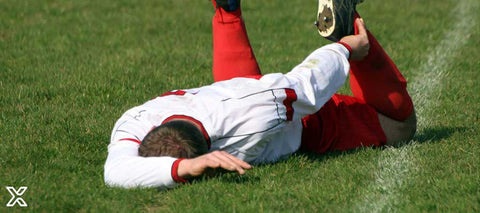Breaking News Is Broken!
The athlete’s media burden
For the love of money
Media shifts ‘process’ to ‘results’ thinking
Meeting the media challenge
This week I want to examine the detrimental performance effects of some of the world's greatest athletes by the global media.
The athlete’s media burden
“Media” is a broad term that involves physical or online newspapers and magazines, television, radio, the Internet, social media channels, advertising, publishers, marketing, journalists, broadcasters, press conferences, commentators, and pundits. The media aims to filter information and present it in a way they believe represents the best ‘sellable story’.
Mass media is a permanent part of modern culture. It is widespread and accessible. Media is all around us and has profound effects upon individuals and society as a whole. There is a swinging pendulum of public opinion which shifts from decrying the ills of the media to extolling the many virtues of on-demand technology. Social media especially has become especially toxic. Facebook, Instagram, Twitter, Skype, Imo, WhatsApp, are few social sites of this era on which millions of people waste their precious time.
I fear many athletes may not appreciate the burden that the media and its created ‘story’ can have on an athlete’s performance and career. Be assured the media’s influence on sports figures is sweeping and pervasive. Many athletes are targets of media prey. Win or lose, their performance (and their life) is publicly dissected by the media. Winning can bring about glorification, expectancy, and criticism. Losing brings negative judgment and more criticism. Champions risk criticism every time they perform.
For the love of money
When we step back and acknowledge the goal of media, its lofty goal of providing accurate and truthful reporting seems illusory. Today’s media is rife with opinions, conclusions, and judgments. But the real reason media exists is to chase profits. Media companies must monetize content.
Breaking news is broken. The most shocking events get the most attention. The more lurid the story, the better its chances of being the rating leader. Capitalistic motives associated with journalism have forced much of today's media to look to the spectacular, the stirring, and the controversial as news stories. It's no longer a race to break the story first or get the facts right. Instead, it's to acquire good ratings in order to get advertisers, so that profits soar.
The media will never have an athlete’s best interest at heart. Why? In my opinion, the media has no heart. It has no conscience, no social responsibility, and no accountability. The media uses biases, distortions, disinformation, and fabrications willy-nilly. Media hype sells.
Athletic performance efficiency is reduced by distraction. Today’s media is a distraction of epic proportion. Take last week's US Open Tennis Championship as an example. The media buildup about Novak Djokovic’s attempt to win a calendar year Slam has been escalating since he won Wimbledon earlier this year.
Djokovic had already claimed titles at the Australian Open and Roland-Garros and then won Wimbledon. Every tennis commentator, magazine, and newsfeed repeatedly regurgitated the same prognostications: Can Novak win the elusive Slam? Will Djokovic make history? Is he ready mentally and physically? Is it time for Novak Djokovic to be celebrated as the greatest male tennis player ever?
After all that fanfare and anticipation, it was almost a miracle that he could even muster average play for the US Open finals. It was no surprise that he was not at the top of his game. The media has been in his head for months – relentlessly pushing and wearing on him. In no way do I diminish Daniil Medvedev’s exceptional performance. Medvedev played some of his best tennis, and I fully expect to see him win more Grand Slams.
For Novak Djokovic, the burden of expectation was too much. Djokovic admitted after the match, “I was glad it was over because the build-up for this tournament and everything mentally and emotionally I had to deal with throughout the tournament the last couple of weeks was just a lot.”

Media shifts ‘process’ to ‘results’ thinking
Djokovic, Federer, and Nadal have completed a career Grand Slam by winning each of the four majors at least once. Novak and his team, like Federer and Nadal, have dedicated themselves to the discipline of “process”. This means regardless of match or tournament win or loss, they stay on track with “process”. They put in the practice time and do the off-court training. They continue to run stats on other players to understand and map out game plans.
They maintain careful nutrition including drink and supplement formulas. They have a wide range of carefully thought-out plans to keep them at their optimal levels. This consistency of rigorous, uncompromised focus on knowledge, calibration, and action is steeped in PROCESS. Champions understand and utilize process. However, the media wants results. They want the scores and stats, the win/loss record, the outcome. That insidious media distraction of ‘results’ over ‘process’ can creep into an athlete’s psyche.
A big part of process is staying mentally competitive and emotionally resolute. A champion’s entourage can shield them inside the training bubble, but their emotional well-being may not be safeguarded against the media storm. We see it happen everywhere – politics, Hollywood, healthcare, sports, etc. Women’s tennis has been particularly plagued by the emotional challenges generated by media pressure. How many times have we witnessed a newly crowned champion be regaled and coerced by the media? Here come the media, and there goes the champion, poof! And it’s no wonder.
Relegated to incessant on-demand interviews or barraged with off-court promotional deals, the athlete can become distracted, unfocused, and even anxious. Whether it’s being pushed to tout the latest sugar water disguised as a sports drink or the media clamoring for more results, the athlete’s performance can undoubtedly suffer due to these distractions.
Athletes have two choices: 1) they can succumb to the challenges of media distractions, or 2) they can meet the challenges of media. Roger Federer is a great example of meeting the media’s challenges. Along with his illustrious career, he has guarded his playing schedule – never compromising. We’ve come to admire his intentional and upbeat interviews. He is brilliant in turning a not-so-nice interrogation around through his demeanor and positivity.
Federer has consistently been the highest-paid tennis player in the world. According to Forbes, his net worth is beyond $450 million. He is expected to become the first tennis billionaire. With all this fame and wealth, he has managed his career and the media wisely.
Federer has carefully limited his product endorsements and promotional advertising. He has purposefully crafted his personal brand. Roger Federer will never endorse an inferior product. We won’t see him wearing a goofy copper wrap masquerading as proper compression gear. He has established a sense of quality and trust with his fans. Federer genuinely loves the game of tennis, its fans, the travel, and its lifestyle. He has been exceptional at staying focused on the process. Kudos to Roger and the team for carefully coordinating his path to success.

Meeting the media challenge
Top athletes are aware that interactions with the media come with the territory. There is a volatile relationship between athletes and the media. However, it can be said that sports and the media need each other in order to thrive. Unfortunately, our modern sports stars must endure unceasing attention and expectation. The media must produce content that’s engaging to the constituency of fans whose level of interest drives the revenue that players rely on to support their sport that allows them to make a living. It’s all circle of life. In addition to coaching and training for their sport, athletes also need coaching and training for dealing with the media.
In last week’s blog, I talked about Naomi Osaka and her US Open meltdown. She has a challenging road ahead. In my opinion, engaging with the Federer Team8 management firm would be a great move. Perhaps some of their knowledge and experience could help her get back on track allowing her tennis career to flourish. Team8 is an agency Federer created whose purpose is to help players navigate their careers.
While Osaka faces tough decisions, the 2021 US Open Tennis Championship concluded with some great matches. This year’s tournament at Flushing Meadows was one of the best that I can remember. I especially enjoyed watching the women’s matches this year. We were all enchanted with two young stars, Emma Raducanu and Leylah Fernandez. Their smiles and enthusiasm were contagious. I was impressed with their articulate interviews.
They reminded me of the way Federer comports himself. Comments like “I just want to put on a good show for everyone,” and “I am excited to play my next opponent” are an example of well-expressed interview responses. And remember, these young women are 18 and 19. Raducanu, the US Open Women’s Champion, said that she made “a purposeful decision not to check social media during the tournament,” adding that she has avoided the news for the past month. Smart girl!
Both of these young women seem to be on the verge of outstanding careers. Let’s hope that they seek out good advisors to help them maneuver through the media and corporate complexities that are already upon them. I bet if Raducanu or Fernandez moved into the Team8 camp, they would be very well cared for.

For the record, I am not a paid endorser of Team8. (Roger, feel free to reach out if you’d like my support.)
Have a thoughtful day!
Coach Fred.



